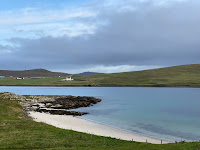Getting in to it
It’s the end of my first full week.
Here are some reflections.
My stress levels are settling to a more manageable level and I’ve started to enjoy the daytime work. I actually have time to spend with patients and give them the input they need. I have time to ask about lifestyle and do a bit of health promotion - who’d have thought it?!
I can deal with the associated clinical admin, and not feel totally fried at the end of a day at the surgery. Time pressure and it’s related stress is not really a thing here. Don’t get me wrong though, my blood pressure still goes through the roof when the on-call phone goes off!
I got out for a short walk before work on one of the few calm days here (according to the nurses the wind blows about 364 days a year on Unst). It was so tranquil and idyllic. We saw a couple of seals enjoying the glassy sea conditions too. It was a shame I didn’t have time to join them for a dip.
The Unst population seems an accident prone lot. I’m not sure what the A&E attendance rate for 650 people should be but it I’m pretty sure it’s been higher than expected over the past week.
In the space of 7 days I’ve sewn up a leg wound (the patient’s next door neighbour’s Collie dog took a disliking to her and decided to take a nice chunk out of her leg). I’ve assessed and referred a man to A&E - gale force winds blew his truck doors onto him pinning him against the truck floor, ouch. Plus the thumb incident (see previous episode).
There is a lot of harmful alcohol use amongst the men. On a serious note, almost every working man I’ve spoken to, drinks too much. It seems some do it out of boredom. If you’re not into wildlife or the outdoors, and have no family around you, life on a remote island could seem pretty dull.
I’m managing clinical risk and uncertainty in a different way. At home in Dorset with 3 local hospitals I might be more inclined to “sit on things” to see if they evolve or get better, with the knowledge (and instruction to the patient) that a trained paramedic in a fully equipped ambulance can scoop them up and take them in to hospital. Here, waiting for things to potentially get worse is a risky business and so I’ve probably referred more patients to hospital than I would normally do. I don’t think the coastguard are likely to be impressed with a 3am request for a helicopter that could have been anticipated earlier.
It’s been refreshing to work somewhere new. Working with different clinicians and reviewing other GPs notes has made me question some of the ways I’ve been managing things for years. I’ve had the time to review guidelines and ensure I’m up to date with things. It’s been nice to have the luxury of time to do this.
And yes, it’s like Local Hero. Everyone seems to have more than one job…The practice manager works in the canteen at the local school and one of the receptionists doubles up as a weekend cashier at the local garage.
I don’t know how I’d fare coming here on my own. It’d be quite lonely in the evenings and weekends. I’m lucky to have John with me - I was worried he’d be bored but he’s got into the slow pace of life and has had the great fortune to see dolphins, otters and plenty of seals whilst I’ve been at work. Not that I’m envious or anything.
Brace yourselves for my last blog coming up - my final week and saying goodbye to Shetland.





Comments
Post a Comment